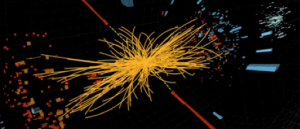In my today’s lecture I explained to the students what might be the most important discovery in physics within the past 100 years, the detection of the Higgs boson with the LHC at Cern in Geneva. Alas, to my disappointment, my excitement was not really shared by the future engineers and computer scientists. Partially, because I might have failed to properly summarise the underlying basics of the theory, partially, because getting even the rough sketch of what “is likely to greatly affect human understanding of the universe” is just too complicated and confusing.
Doesn’t that mean that today’s theoretical description of the nature and universe is so far from our common way of thinking, that graduate scientists can hardly understand even it’s very basics? What kind of knowledge about “the universe” is it, which can only be discussed amongst a handful of experts world-wide? And, is there an alternative and satisfying way to “understand our world”, which does not require years of hard work in the field of theoretical physics?
I imagine a dialogue between a scientist (maybe at Cern) and Chao-Chou, the ancient Chinese Chan Buddhist Master:
Scientist:We just detected the Higgs boson, that indicates our theory of the Universe might be correct !
Chao-Chou: Did you wash your bowl ?
No … Chao-Chou might have asked on July 4th, 2012 “Did you switch of light ?”

Comments are closed, but trackbacks and pingbacks are open.